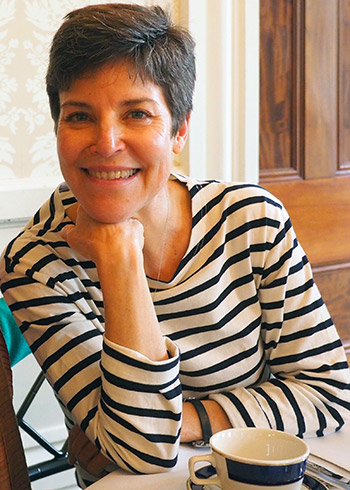Professor Hollie Harder
Liberation Through Language
For Hollie Harder, professor of French and Francophone studies at Brandeis, one of the greatest gifts of language acquisition has been the realization that she had choices about how to lead her life, options that extended well beyond those offered by her home culture in the United States.
 Hollie Harder
Hollie Harder
Harder's discovery of France at age 18 was a life-changing experience that introduced her to a world she had only imagined as a girl growing up outside of Kansas City, Missouri. At that time, her only knowledge of France had come from watching the singer Mireille Mathieu on "The Ed Sullivan Show." In her teenage years, Harder found high school less than satisfying; her small town seemed stifling and provincial, and she longed for the opportunity to explore more in depth the art, music, dance and literature, which, through books, had captured her imagination.
In an out-of-character move, the normally timid Harder applied to be foreign exchange student before starting college. By chance, she was placed in France with a host family in Fos-sur-Mer, a small industrial town on the Mediterranean Sea. Although she arrived with only a rudimentary level of French, she quickly absorbed the French language and culture with the help of her monolingual host family and the students and teachers at the local lycée she attended.
During the course of 11 months, she spoke and heard English only once, when she talked to her family on a landline during the winter holidays. Moreover, learning the French language and culture exposed her not only to different ways of expressing ideas, but also to the notion that the very ideas could be different because they were, in a very real sense, a product of the French language in which they were formed.
At the University of Kansas, the French courses that she enrolled in exclusively for "fun" continued to nurture her Francophile and Francophone soul. She ended up spending her junior year studying in Bordeaux, France, and a year of postgraduate study in Strasbourg, France, before finishing her PhD in French literature and landing at Brandeis University.
For Harder, one of the most rewarding aspects of teaching at Brandeis has been helping students experience in the language classroom what it feels like to be an outsider so that they can more easily empathize with the situation of those who struggle for equality, inclusion and acceptance. Language-learners often feel uneasy speaking and expressing their thoughts in an unfamiliar language, and they may feel uncomfortable with some of the cultural practices they are expected to observe in the classroom. But the experience gives students the opportunity that no other course of study offers: they are put into a situation where they do not just learn about cultural differences, they actually experience what difference feels like.
Harder finds this element of language learning especially important at Brandeis because of the social justice mission of the university. Language teachers "put people in the position of being the outsider so that they understand what it is to be an outsider wherever they are," she said.
For instance, learners discover that the French conception of time (past, present and future) differs significantly from that of most Americans. The French conceive of themselves as part of a generation that creates a kind of chain with links to the past and to the future. In this sense, success comes from continuity: maintaining a family business, for example, and continuing the "chaîne des générations." In the United States, however, our image of success lies in breaking away from tradition and creating a new path.
In her courses, Harder helps students make sense not only of their world, but also the worlds of other people. Through literature, film, music and even "bandes dessinées" (Franco-Belgian comics), students come to understand that different languages offer new ways of thinking about the world, a means to understand a different mentality by "putting yourself into someone else's skin," as the French say.
It is a process that may, in fact, provide alternatives for students in their own lives, like the alternatives Harder found herself. "French changed my life; it gave me a life," she said.
This interview was conducted in 2018-19 by Diana Filar, PhD’21.